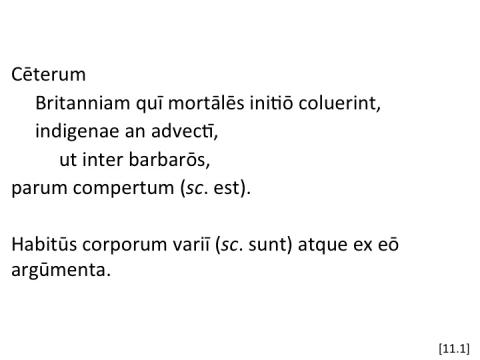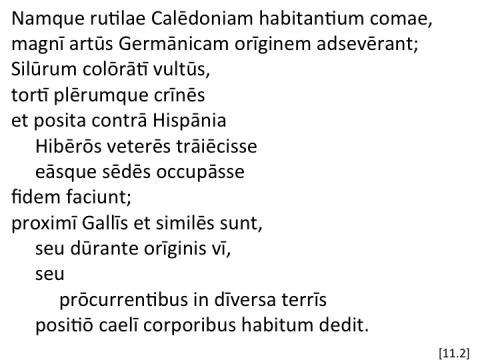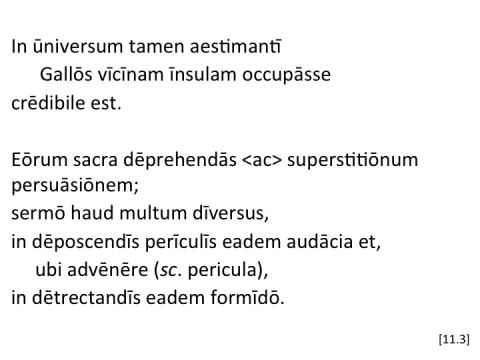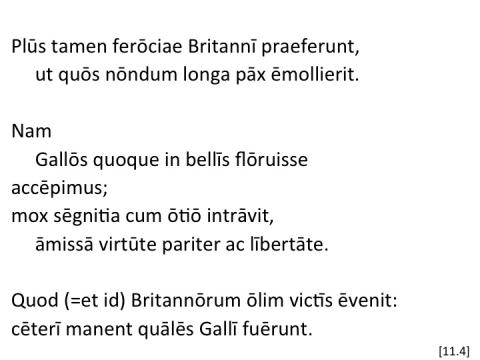Overview: The ethnology of Britain. (Stuart)
11.1
cēterum: resuming the description proper after the digression about the ocean and the tides. (Stuart)
initiō coluerint: geological and archaeological investigation have traced the beginnings of man in Britain far beyond the limits comprehended by Tacitus and his age ... The ethnological data here collected by Tacitus were derived from a comparatively late stage of civilization. (Stuart)
ut inter barbarōs: "as one would naturally expect in the case of barbarians." There would be no historical tradition; there might have been a poetical and mythological tradition, just as the Germans traced their descent from Tuisto (Germania, 2), the Gauls from Dis (Caesar BG 6.18). (Stuart) ut: "as is usual," explains parum compertum. (Pearce); "as might be expected." This elliptical use of ut occurs often in Tacitus, e.g. 18.4. (Gudeman)
parum compertum: sc. est. (Damon)
habitūs corporum: sc. sunt. (Damon); "physical types." (Stuart)
ex eō: "from the variation in types." In the Germania, chapter 2, Tacitus rejects the immigration theory which he accepts here, on the ground that Germany was too forbidding a country to tempt settlers from other lands! (Stuart) ex eō argūmenta: sc. petuntur. On the ellipsis, see Introd. p. xxxi, #6. (Gudeman)
11.2
rutilae ... comae: the regular description of the Germans' hair. (Stuart) rutilae ... artūs: see Germ. 4 rutilae comae, magna corpora. Tacitus’ information was probably derived from Agricola, though he may have seen some of the natives in Rome. (Gudeman)
Germānicam orīginem: the possibility of a prehistoric invasion by Northmen has been discussed by ethnologists, but the question remains unsettled. Such evidence as there is makes against the view. (Stuart); Tacitus is probably wrong in his conclusion, though his data (as derived from Agricola himself) are very likely correct. The Caledonians (known later at Picts) were in any case the representatives of a tribe pushed northward by conquests from the south—possibly the Celtic tribe of Goidels, possibly a still more primitive race. (Pearce)
Silurum: a tribe which lived in southern Wales. They offered stubborn resistance to Roman rule and were never actually Romanized. (Stuart); they dwelt in what is now South Wales and Monmouthshire, and were subdued by Frontinus. See ch. 17.2. Their origin, probably Celtic, is still an unsolved problem of ethnology. (Gudeman)
colōrātī: "sunburnt," "swarthy." (Pearce); usually taken in the sense of "swarthy, sunburnt," an epithet applied by the ancients to the Hindoos, Chinese, and Etruscans; but such a designation seems quite out of place with respect to a nation living in northern climes, and would be inconsistent with their Celtic origin, nor is there any evidence that the Iberians of Spain were colorati; finally, it is important to observe that in the rest of the description of the Silures, unlike that of the Caledonians, no physical, but only external and acquired characteristics are referred to. It will, therefore, be best to interpret the epithet in a like sense here, i.e. painted, possibly tattooed, which is a well-attested practice of the Britons. (Gudeman)
tortī: "curly." (Stuart)
et = et praeterea, "and the fact moreover." See note on 10.3. On et after an asyndeton, see Introd. p. xxviii, 11c. (Gudeman)
posita contrā Hispānia: the stress of the meaning falls on the participle which is fused into a single idea with the noun ... . The real subject here in not "Spain," but "the fact that Spain lies opposite." ... The construction is due to the Roman liking for a personal subject. There seems to be no evidence sufficient to support Tacitus’ contention that Iberians settled in Britain. (Pearce) [A&G 420.5]
fidem: see note on 1.3. (Pearce)
proximī Gallīs: subject. (Pearce) proximī Gallīs et similēs, etc.: i.e. the tribes dwelling nearest to the Gauls (viz. the Cantians) also (et = etiam) resemble them. The two seu clauses do not give alternative reasons, but the first is in a measure the direct result of the proximity, while the similar climatic conditions account for the ethnological resemblance. (Gudeman) et similēs sunt: predicate. (Pearce) similēs: sc. Gallis. (Pearce) et = "also." (Pearce)
dūrante orīginis vī: "by the persistence of natural type." (Stuart) vī: "the effect." (Pearce) vī: this word is an emendation for the manuscript's usu, which some editors retain (see note below). (Damon) dūrante orīginis ūsū: "because the customs of their original state were retained." durare in the sense of to survive, seems to occur first in Livy. (Gudeman)
prōcurrentibus in dīversa: "extending in opposite directions," hence, "approaching each other." (Stuart) in dīversa: the thought is obscurely suggested by the words. The implied meaning is that as Britain and Gaul (judged from an intermediate standpoint) run in different directions—the former south, the latter north—they almost meet, and hence arises the similarity of the southernmost Britons to their nearest Gallic neighbors. Perhaps Tacitus wrote in adversa, "so as to face each other." (Pearce); "in opposite directions." For the meaning "opposite," see e.g. ch. 23. (Gudeman)
positiō caelī: the influence of climate on physical types is a well-attested fact. (Stuart); "climate." (Gudeman)
habitum: sc. eundem. The ellipsis of the demonstrative pronoun is particularly common in Tacitus. Introd. p. xxxi, 4. (Gudeman)
11.3
in ūniversum ... aestimantī: "in the opinion of one who regards the matter in all its aspects." The dative is closely akin to transgressis, chapter 10.3. (Stuart); "but on a general consideration." The so-called "dative of the person judging." (Gudeman) [A&G §378]
tamen, &c.: gives what is probably the true reason, viz. immigration from Gaul as opposed to the two previously suggested explanations, viz. identity of origin and similarity of physical conditions. (Pearce)
Gallōs: modern theory substantiates the assumption of a Celtic conquest of Britain in pre-Roman times. There were in fact two waves of immigration, the first possibly in the eighth century BCE, the second in the second century before our era. The first comers, the Goidels, overran Great Britain and Ireland and were the ancestors of the Gaels in Ireland and the Scottish Highlands. They were followed by the Brythons, who came from Belgic Gaul and were of the same stock and, as Tacitus says, spoke the same language as the Gauls who remained on the Continent. (Stuart)
eōrum: sc. Gallorum. (Gudeman) eōrum sacra: i.e. Druidism, which was the common ritual of the inhabitants of Britain and the Celts of the Continent. In the time of Caesar Britain was the fountain head of Druidic influence. (Stuart)
dēprehendās: i.e. among the Britons. "Potential" subjunctive. (Pearce) [A&G 447.2]; sc. apud Britannos. To one ignorant of their common origin the coincidence would be surprising. On the force of this verb, see note on 7.2, and on the collocatio verborum, characteristic of Tacitus, see Introd. p. xxvi, 4. (Gudeman)
persuāsiōnem: "belief," with an objective genitive. The singular form is a more convincing emendation than the plural persuasiones (see note below); the manuscript reads persuasione and omits ac. (Damon) [A&G 347-48] superstitiōnum persuāsiōnēs: "religious convictions, cult." Persuasio is very rarely found in the plural. Caesar, while confirming the identity of the cult, asserts, in apparent contradiction to Tacitus, that it originated in Britain and was adopted by the Gauls ... . The truth seems to be that the ritual was originally Celtic, but, owing to the isolation of the British Celts, was by them developed on more rigid and orthodox lines. (Gudeman)
sermō ... dīversus: of the two great branches of the Celtic language in the British islands, the Goidelic or Q Celts and the Brythonic or P Celts, we must probably look to the latter, represented by Welsh, Breton, and Cornish, as exhibiting the greater similarity with the Gallic tongue, but the ancients did not advance beyond a merely perfunctory observation of linguistic phenomena, and therefore, little or no reliance can be placed upon their statements in such matters. (Gudeman)
in dēposcendīs ... formīdō: observe the artistic balancing of clauses. (Gudeman)
ubi advēnēre: sc. pericula. (Gudeman)
11.4
praeferunt = prae se ferunt. (Pearce); "exhibit." (Stuart); for the more usual prae se ferre, see ch. 43.3. (Gudeman)
ut quōs ... ēmollierit: causal subjunctive. (Pearce) [A&G 535e note 1]
nam: explains the implication of the last sentence, viz. that the Gauls are not molles natura, but longa pace emolliti. (Pearce)
accēpimus: Caesar, BG 6.24.1, says there was a time when the Gauls surpassed the Germans in courage. (Stuart)
amissa, etc.: on the initial position of the verb in the singular with two subjects, especially common in ablative absolute constructions, see Introd. p. xxvi, #3. (Gudeman)
pariter: on the position, see Introd. p. xxvi, #3. (Gudeman)
ōlim victīs: i.e. those subdued by Plautius and his immediate successors. See introduction. (Pearce); refers to the expedition under Claudius in 43 CE. (Gudeman)
cēterī: the still unsubdued tribes in the north and west. (Gudeman)
fuērunt: i.e. before segnitia cum otio intravit. (Gudeman)




